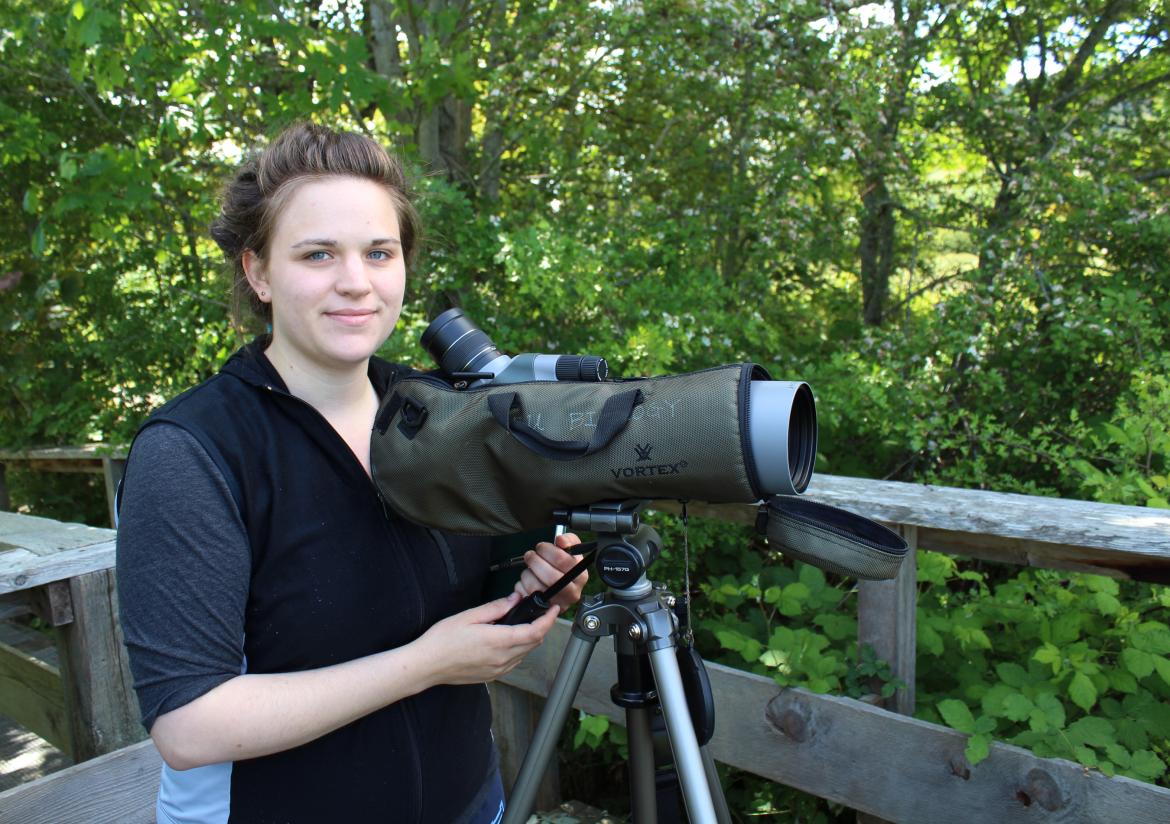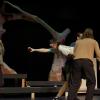
June 19, 2012 - 3:18am
VIU Biology student Stephanie Thorpe is working toward her Bachelor of Science degree as she packs a spotting scope, binoculars and notebook on the 2.2-kilometre loop trail around Buttertubs Marsh.
From shoreline vantage points she focuses on basking logs and clearings where Western Painted Turtles share space with more common Red-eared Slider Turtles and Wood Ducks. On a recent outing, she spotted 12 Red-Eared Sliders, three Western Painted and one Reeves Pond Turtle.
Under the supervision of VIU Biology Professor Jane Watson, Thorpe is earning senior-level credits and providing valuable information on an endangered species in BC.
“The work that Stephanie does will be a great asset to us,” says Bill Merilees, chair of the Buttertubs Marsh Liaison Committee.
The Western Painted Turtle is native to BC but its two populations – Pacific and Rocky Mountain – are both under pressure as natural habitat is lost to development. Pacific Western Painted Turtles are listed as Endangered (its provincial status is “red”) with their inland relatives designated as “Special Concern.”
Painted Turtles in Buttertubs began to attract increased attention in 2011 when a resident spotted a female nesting in the conservation area. The marsh, which was purchased by the Nature Trust of BC in 1975, is home to a variety of native species but there is an ongoing campaign to reduce the impact of invasive species.
On land, there are regular work parties to keep broom plants in check along with Himalayan blackberry, English Hawthorne and spurge laurel. In the marsh, red-eared slider turtles, the kind commonly found in pet shops, are thriving and competing for habitat.
Community volunteers, Nature Trust specialists, BC wildlife biologists, city environmental staff, VIU students and faculty have worked to improve habitat for turtles. Basking logs have been introduced so turtles can sun themselves.
Thorpe’s observations will help determine how well the logs are being used. She has already found some are less attractive to turtles possibly because of exposure to wind, competition with other species, unfavourable underwater vegetation or some other reason.
Merilees sees Thorpe’s work as important to establish a baseline for improving conditions for native species. “Before you can do any management, you have to know what you are dealing with.”
Watson sees the Biology 491 course which focuses on undergraduate research as extremely valuable to students and VIU’s community partners. The course requires students complete a research project during their fourth year of studies.
Students are provided the opportunity to interact with their peers and with scientists affiliated with various local agencies, organizations or institutions, in addition to VIU Faculties. Final research results are presented orally in a symposium format and as a written report.
"Research provides students with the opportunity to apply the general skills and concepts that they learn in the classroom to real world questions or problems, in short it makes their studies relevant,” says Watson. “Field research invariably requires that students find creative solutions to technical problems, and learn to be patient and persistent, skills and traits that are best acquired through practice.”
“In her research Stephanie will also learn about the value of collaboration and community involvement, as she works with biologists from the BC Ministry of Natural Resource and Forest Operations, and the Nature Trust as well as local residents from the Buttertubs Marsh Liaison Committee.”
Trudy Chatwin, Species at Risk Biologist for the Ministry of Forests, Lands and Natural Resource Operations, West Coast Region, says “Working with Vancouver Island University students continues to provide a real benefit to shared stewardship and resource management.“
Stephanie’s work on Western Painted Turtles at Buttertubs Marsh will provide important data to assist in planning for conservation of Painted Turtles as well as restoration and management of the marsh area.”
Thomas Reid, Manager of the Nature Trust’s Vancouver Island Conservation Land Management Program is equally appreciative. “The Nature Trust of BC and Ducks Unlimited Canada are excited to be working with Vancouver Island University on this important project.”
“By monitoring our restoration project for the endangered Western Painted Turtle we will be better able to assess the effectiveness of our restoration techniques and to gain a better understanding of Painted Turtle habitat use at Buttertubs Marsh.”
As for Thorpe, she is using the experience to prepare her for a career working as a field biologist. In addition to using the marsh research for her Biology course, she is compiling data for a Geographic Information Systems course with her findings used to produce a map of the area and its natural features.
-30-
Student snapshot: Stephanie Thorpe
Studies: 4th year Bachelor of Science, Biology
What attracted you to study biology?
“I entered university with a passion for environmental studies. After my first year, it became clear to me that biology would be the program that would offer me the chance to learn more about how the environment affects animal physiology and behaviour. As a biology student I have also been given the opportunity to learn how ecosystems function on both a community and microscopic level.”
What attracted you to VIU?
“Low tuition and small class sizes. It's nice when world-class professors know you by a first-name basis.”
What are your goals in the field?
“I want to play a role, small or large, in preventing habitat loss and species extinction.”
More photos on Flickr:
For more information:
Biology at VIU:
Buttertubs Marsh:
Nature Trust of British Columbia:
Species at Risk in BC:
Tags: In the Community






